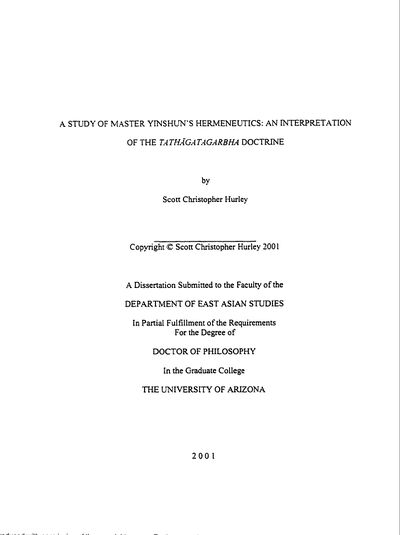A Study of Master Yinshun’s Hermeneutics: An Interpretation of the Tathāgatagarbha Doctrine
< Books
Abstract
This study is an examination of Master Yinshun's hermeneutics. It focuses especially on his interpretation of the Buddhist concept known as the tathagatagarbha, which refers to the idea that all sentient beings intrinsically possess the "womb of the Buddha." In some explanations of this teaching, the tathāgatagarbha is symbolic of the practitioner's potential for attaining enlightenment. In others, it functions as a synonym for the Ultimate and becomes the eternalistic substrate for all of existence. It is this latter view to which Yinshun takes exception, seeing it as antithetical to the doctrine of emptiness which espouses the notion that all things, including ideas, material objects, and living beings, lack a permanent and independent nature and thus cannot possess an unchanging, eternalistic form.
I focus particularly on Yinshun's text A Study of the Tathāgatagarbha, for it serves as a concise statement of his interpretation of the tathāgatagarbha and its relationship to emptiness. In this text, Yinshun continually asserts the doctrine of emptiness as the definitive expression of Buddhist truth and relegates the tathāgatagarbha to the category of expedient means. He does this by examining the development of the tathāgatagarbha emphasizing particularly its evolution within pre-Mahāyāna and Mahāyāna textual sources said to have had their genesis in India such as the Āgamas, the Perfection of Wisdom Sūtras and the Ratnagotravibhāga. For Yinshun, to regard the tathāgatagarbha as the ultimate truth rather than as an expedient means can only result in misguided practice and confusion about how to attain enlightenment.
I conclude by asking a number of general questions about Yinshun's thought and its relationship to the early to mid-twentieth century intellectual milieu in China. I also inquire about how Yinshun's ideas have contributed to the development of contemporary Chinese Buddhist movements flourishing in Taiwan today. (Source: Worldcat Library Materials Online)
| Citation | Hurley, Scott. "A Study of Master Yinshun’s Hermeneutics: An Interpretation of the Tathāgatagarbha Doctrine." PhD diss., University of Arizona, 2001. https://repository.arizona.edu/bitstream/handle/10150/279857/azu_td_3031364_sip1_m.pdf;jsessionid=7F7C9754E7B4C951472D8BB20D5B4BBE?sequence=1. |
|---|---|

